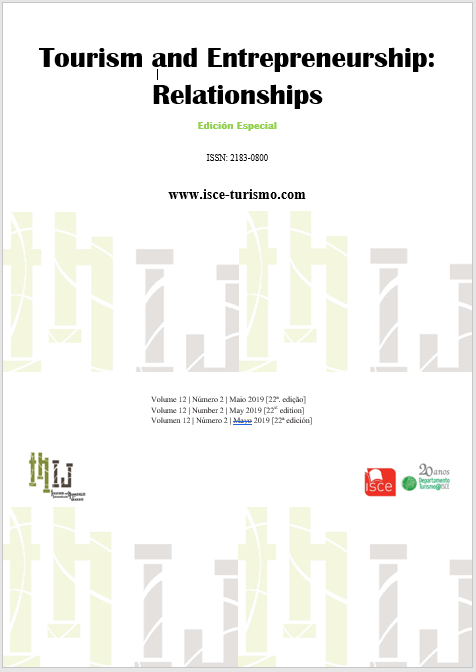Memorable tourist experiences
DOI:
https://doi.org/10.57883/thij12(2)2019.30593Keywords:
Tourism, Memorable tourist experienceAbstract
This study was quantitative by means of the survey method. 421 questionnaires were used with tourists evaluating the memorable tourist experiences based on the Aroeira, Dantas and Gosling model (2016), identifying: the country, which was related to the memorable tourist experience chosen as the basis for responding to the survey; the type of accommodation used during the memorable tourist experience; the reason for the trip; and the budget; in terms of perceptions about the memorable tourist experience, the results indicated that all dimensions - hedonism, novelty, local culture, knowledge, renewal, significance and involvement - proposed by Kim (2009) were relevant. However, there were still differences and some contributed more than others to make the experience memorable. What stood out the most was hedonism, followed by knowledge, involvement, novelty, renewal, local culture and significance.
References
Aroeira, T., Dantas A. C. & Gosling, M. de S. (2016). Experiência turística memorável, percepção cognitiva, reputação e lealdade ao destino: Um modelo empírico. Revista Turismo – Visão e Ação, Balneário Camboriú, 18 (3), 584-610. Acedido a 19/03/2017. Retirado de http://siaiap32.univali.br/seer/index.php/rtva/article/viewFile/ 9194/5106.
Beni, M. C. (2007). Análise estrutural do turismo (12ª ed.). São Paulo: Editora Senac.
Brasil, Ministério do Turismo. (2010) Tour da experiência: Cartilha completa. Brasília, DF. Acedido a 19/01/2017. Retirado de http://www.turismo.gov.br/sites/default/turismo/o_ministerio/public acoes/downloads_publicacoes/Cartilha_Metodologia_Projeto_Econo mia_Experiencia.pdf
Ferrell, O. C. & Hartline, M. D. (2009). Estratégia de marketing. São Paulo: Cengage Learning.
Kim, J. H. (2009). Development of a scale to measure memorable tourism experiences. 141 f. Tese de doutoramento. Indiana University. School of Health, Physical Education, and Recreation, Indiana, 2009. Aceido a 17/03/2017. Retirado de https://scholarworks.iu.edu/dspace/bitstream/handle/2022/8786/Kim_indiana_0093A_10479.pdf?sequ
Kim, J. H. Richie, J. B. & McCormick, B. (2010). Development of a scale to measure memorable tourism experiences. Journal of Travel Research, 51 (1),12-25.
Larrosa, J. (2002). Notas sobre a experiência e o saber da experiência. Revista Brasileira de Educação, Campinas, 19, 20-28.
Lohmann, G., Panosso Netto, A. (2008). Teoria do turismo: Conceitos, modelos e sistemas. São Paulo: Alep.
Marcellino, N. C. (2002). Estudos do lazer: Uma introdução (3ª ed.). Campinas, SP: Autores Associados.
Norman, D. (2009). Memory is more important than actuality.Interactions Magazine, 16 (2), 24-26.
Oh, H., Fiore, A. M& Jeoung, M. (2007). Measuring experience economy concepts: Tourism applications. Journal of Travel Research, 46 (2), 119-132. Acedido a 16/03/2017. Retirado de http://journals.sagepub.com/doi/pdf/10.1177/0047287507304039.
Panosso Netto, A. & Gaeta, C. (2010). Turismo de experiência. São Paulo: Senac.
Panrotas. (2017) Oito tendências hoteleiras para ficar de olho em 2018. Acedido a 12/02/2018. Retirado de http://www.panrotas.com.br/noticia- turismo/hotelaria/2017/10/oito-tendencias-hoteleiras-para-ficar-de-olho-em-2018_150459.html.
Pine II, B. J. & Gilmore, J. H. (1998). Welcome to the experience economy. Harvard Business Review, 97-105. Acedido a 15/03/2017. Retirado de https://hbr.org/1998/07/welcome-to-the-experience-economy.
Pizam, A. (2010). Creating memorable experiences. International Journal of Hospitality Management, 29 (3), 343. Acedido a 15/03/2017. Retirado de http://doi.org/10.1016/j.ijhm.2010. 04.003.
Porter, M. E. (2004). Estratégia competitiva: Técnicas para análise de indústrias e da concorrência (2ª ed.). Rio de Janeiro: Campus.
Ritchie J. R. B. & Crouch, G. (2003). The competitive destination: A sustainable tourism perspective. Cambridge, MA: CABI Publishing.
Stamboulis, Y. & Skayannis, P. (2003) Innovation strategies and technology for experienced-based tourism. Tourism Management, 24 (1), 35-43. Acedido a 15/03/2017. Retirado de http://dx.doi.org/10.1016/S0261- 5177(02)00047-X.
The Verge. (2018). Airbnb is expanding its experiences feature to 200 cities this year. Acedido a 12/02/2018. Retirado de https://www.theverge.com/2018/1/28/16942308/airbnb-expanding- investing-experiences-200-cities-2018.
Trigo, L. G. G. (2010). A viagem como experiência significativa. In A. Panosso Netto & C. Gaeta (orgs.). Turismo de experiência (pp. 21-42). São Paulo: Editora Senac.
Tung, V. W. S. & Ritchie, J. R. B. (2011). Exploring the essence of memorable tourism experiences. Annals of Tourism Research, 38 (4), 1367-1386.
Downloads
Published
How to Cite
Issue
Section
License
Copyright (c) 2023 This work is licensed under a Creative Commons - Attribution 4.0 International (CC BY 4.0)

This work is licensed under a Creative Commons Attribution 4.0 International License.
This work is published under the Creative Commons Attribution 4.0 International License.






